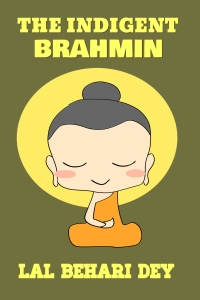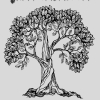
There was a Brahman who had a wife and four children. He was very poor. With no resources in the world, he lived chiefly on the charity of the rich. His gains were considerable when marriages were celebrated or funeral ceremonies were performed. But as his parishioners did not marry every day, neither did they die every day, he found it difficult to make the two ends meet. His wife often rebuked him for his inability to give her adequate support, and his children often went about naked and hungry. But though poor, he was a good man. He was diligent in his devotions, and there was not a single day in his life in which he did not say his prayers at stated hours. His tutelary deity was the goddess Durga, the consort of Siva, the creative Energy of the Universe. Every day he neither drank water or tasted food till he had written in red ink the name of Durga at least one hundred and eight times. And the rest of the day, he incessantly uttered, “O Durga! O Durga! Have mercy upon me.” Whenever he felt anxious on account of his poverty and his inability to support his wife and children, he groaned out—“Durga! Durga! Durga!”
One day, being very sad, he went to a forest many miles distant from the village where he lived and indulging his grief wept bitter tears. He prayed in the following manner:—“O Durga! O Mother Bhagavati! Will you not make an end of my misery? Were I alone in the world, I should not have been sad on account of poverty; but you hast given me a wife and children. Give me, O Mother, the means to support them.” It so happened that on that day and on that very spot, the god Siva and his wife Durga were taking their morning walk. The goddess Durga, on seeing the Brahman at a distance, said to her divine husband—“O Lord of Kailas! Do you see that Brahman? He is always taking my name on his lips and offering the prayer that I should deliver him out of his troubles. Can we not, my lord, do something for the poor Brahman, oppressed as he is with the cares of a growing family? We should give him enough to make him comfortable. As the poor man and his family have never enough to eat, I propose that you give him a handi which should yield him an inexhaustible supply of mudki.” The lord of Kailas readily agreed to the proposal of his divine consort, and by his decree, created on the spot a handi possessing the required quality. Durga then, calling the Brahman to her, said,—“O Brahman! I have often thought of your pitiable case. Your repeated prayers have at last moved my compassion. Here is a handi for you. When you turn it upside down and shake it, it will pour down a never-ceasing shower of the finest mudki, which will not end till you restore the handi to its proper position. Yourself, your wife, and your children can eat as much mudki as you like, and you can also sell as much as you like.”
The Brahman, delighted beyond measure at obtaining so inestimable a treasure, made respects to the goddess and, taking the handi in his hand, proceeded towards his house as fast as his legs could carry him. But he had not gone many yards when he thought of testing the efficacy of the wonderful vessel. Accordingly, he turned the handi upside down and shook it when, lo and behold! A quantity of the finest mudki he had ever seen fell to the ground. He tied the sweetmeat in his sheet and walked on. It was now noon, and the Brahman was hungry, but he could not eat without his ablutions and prayers. As he saw in the way an inn, and not far from it, a tank, he decided to halt there that he might bathe, say his prayers, and then eat the much-desired mudki. The Brahman sat at the innkeeper’s shop, put the handi near him, smoked tobacco, smeared his body with mustard oil, and before proceeding to bathe in the adjacent tank gave the handi in charge to the innkeeper, begging him, again and again, to take special care of it.
When the Brahman went to his bath and his devotions, the innkeeper thought it strange that he should be so careful as to the safety of his earthen vessel. He thought there must be something valuable in the handi, he thought, otherwise why should the Brahman take so much thought about it? His curiosity being excited, he opened the handi, and to his surprise, found that it contained nothing. What can be the meaning of this? Thought the innkeeper within himself. Why should the Brahman care so much for an empty handi? He took up the vessel and began to examine it carefully, and when, in the course of examination, he turned the handi upside down, a quantity of the finest mudki fell from it and went on falling without intermission. The innkeeper called his wife and children to witness this unexpected stroke of good fortune. The showers of the sugared fried paddy were so copious that they filled all the vessels and jars of the innkeeper. He resolved to steal this precious handi and accordingly put in its place another handi of the same size and make. The ablutions and devotions of the Brahman being now over, he came to the shop in wet clothes reciting holy texts of the Vedas. Putting on dry clothes, he wrote on a sheet of paper the name of Durga one hundred and eight times in red ink, after which he broke his fast on the mudki his handi had already given him. Thus refreshed and about to resume his journey homewards, he called for his handi, which the innkeeper delivered to him, adding—“There, sir, is your handi. It is just where you put it; no one has touched it.” The Brahman, without suspecting anything, took up the handi and proceeded on his journey.
As he walked on, he congratulated himself on his singular good fortune. “How agreeably,” he thought within himself, “will my poor wife be surprised! How greedily the children will devour the mudki of heaven’s own manufacture! I shall soon become rich, and lift up my head with the best of them all.” The pains of travelling were considerably alleviated by these joyful anticipations. He reached his house, and calling his wife and children, said—“Look now at what I have brought. This handi that you see is an unfailing source of wealth and contentment. You will see what a stream of the finest mudki will flow from it when I turn it upside down.” The Brahman’s good wife, hearing of mudki falling from the handi unceasingly, thought that her husband must have gone mad. She was confirmed in her opinion when she found that nothing fell from the vessel though it was turned upside down again and again. Overwhelmed with grief, the Brahman concluded that the innkeeper must have played a trick with him. He must have stolen the handi Durga had given him and put a common one in its stead. He went back the next day to the innkeeper and charged him with having changed his handi. The innkeeper put on a fit of anger, expressed surprise at the Brahman’s impudence in charging him with theft, and drove him away from his shop.
The Brahman then decided to have an interview with the goddess Durga again, who had given him the handi and accordingly went to the forest where he had met her. Siva and Durga again favoured the Brahman with an interview. Durga said—“So, you have lost the handi I gave you. Here is another, take it and make good use of it.” The Brahman, elated with joy, paid respect to the divine couple, took up the vessel, and went on his way. He had not gone far when he turned it upside down and shook it to see whether any mudki would fall from it. Horror of horrors! Instead of sweetmeats, about a score of demons, of gigantic size and grim visage, jumped out of the handi and began to assault the astonished Brahman with blows, fisticuffs and kicks. He had the presence of mind to turn up the handi and cover it when the demons forthwith disappeared. He concluded that this new handi had been given him only for the punishment of the innkeeper. He accordingly went to the innkeeper, gave him the new handi in charge, begged of him carefully to keep it till he returned from his ablutions and prayers.
Delighted with this second godsend, the innkeeper called his wife and children and said—“This is another handi brought here by the same Brahman who brought the handi of mudki. This time, I hope, it is not mudki but sandesa. Come, be ready with baskets and vessels, and I’ll turn the handi upside down and shake it.” This was no sooner done than scores of fierce demons started up, who caught hold of the innkeeper and his family and beat them mercilessly. They also began upsetting the shop and would have completely destroyed it if the victims had not begged the Brahman, who had by this time returned from his ablutions, to show mercy to them and send away the terrible demons. The Brahman acceded to the innkeeper’s request. He dismissed the demons by shutting up the vessel; he got the former handi, and with the two handis went to his native village.
On reaching home, the Brahman shut the door of his house, turned the mudki-handi upside down, and shook it. The result was an unceasing stream of the finest mudki that no confectioner in the country could produce. The man, his wife, and their children devoured the sweetmeat to their hearts’ content, and all the available earthen pots and pans of the house were filled with it. The Brahman resolved the next day to turn confectioner, open a shop in his home, and sell mudki.
On the very next day, the shop was opened, the whole village came to the Brahman’s house to buy the wonderful mudki. They had never seen such mudki in their life; it was so sweet, white, large, and luscious. No confectioner in the village or any town in the country had ever manufactured anything like it. The reputation of the Brahman’s mudki extended, in a few days, beyond the bounds of the village, and people came from remote parts to purchase it. Cartloads of the sweetmeat were sold every day, and the Brahman became very rich in a short time. He built a large brick house and lived like a nobleman of the land. Once, however, his property was about to go to wreck and ruin. His children one day, by mistake, shook the wrong handi, and a large number of demons dropped down and caught hold of the Brahman’s wife and children and were striking them mercilessly when luckily the Brahman came into the house and turned up the handi. In order to prevent a similar catastrophe in future, the Brahman shut up the demon-handi in a private room to which his children had no access.
Pure and uninterrupted prosperity, however, is not the lot of mortals. Though the demon-handi was put aside, what security was there that an accident might not befall the mudki-handi? One day, during the absence of the Brahman and his wife from the house, the children decided to shake the handi. But as each of them wished to enjoy the pleasure of shaking it, there was a struggle to get it, and in the melee, the handi fell to the ground and broke. It is needless to say that the Brahman, when on reaching home he heard of the disaster, became inexpressibly sad. The children were, of course, well cudgelled, but no amount of flogging of children could replace the magical handi. After some days, he again went to the forest and offered many a prayer for Durga’s favour.
At last, Siva and Durga again appeared to him and heard how the handi had been broken. Durga gave him another handi, accompanied with the following caution—“Brahman, take care of this handi. If you again break it or lose it, I’ll not give you another.” The Brahman paid his respects again and went away to his house at one stretch without halting anywhere. On reaching home, he shut the door of his house, called his wife to him, turned the handi upside down, and began to shake it. They were only expecting mudki to drop from it. Instead of mudki, an endless stream of beautiful sandesa issued from it. And such sandesa! No confectioner of Burra Bazar ever made its like. It was more the food of gods than of men. The Brahman forthwith set up a shop for selling sandesa, the fame of which soon drew crowds of customers from all parts of the country. At all festivals, at all marriage feasts, at all funeral celebrations, at all Pujas, no one bought any other sandesa than the Brahman’s. Every day, and every hour, many jars of gigantic size, filled with the delicious sweetmeat, were sent to all parts of the country.
The wealth of the Brahman excited the envy of the Zamindar of the village, who, having heard that the sandesa was not manufactured but dropped from a handi, devised a plan for getting possession of the miraculous vessel. At the celebration of his son’s marriage, he held a great feast, inviting hundreds of people. As many mountain loads of sandesa was required for the purpose, the Zamindar proposed that the Brahman bring the magical handi to the house where the feast was held. The Brahman at first refused to take it there, but as the Zamindar insisted on its being carried to his own house, he reluctantly consented to take it there. After many Himalayas of sandesa had been shaken out, the Zamindar took possession of the handi, and the Brahman was insulted and driven out of the house. Without giving vent to anger in the least, the Brahman quietly went to his house and, taking the demon-handi in his hand, came back to the door of the Zamindar’s house. He turned the handi upside down and shook it, at which a hundred demons started up as from the vasty deep and enacted a scene which it is impossible to describe. The hundreds of guests bidden to the feast were caught hold of by the unearthly visitants and beaten. The women were dragged by their hair from the Zenana and dashed about amongst the men, while the big and burly Zamindar was driven about from room to room like a bale of cotton. If the demons had been allowed to do their will only for a few minutes longer, all the men would have been killed, and the very house razed to the ground. The Zamindar fell prostrate at the feet of the Brahman and begged for mercy. Mercy was shown him, and the demons were removed. After that, the Brahman was no more disturbed by the Zamindar or anyone else; and he lived many years in great happiness and enjoyment.
About the Author







Comments